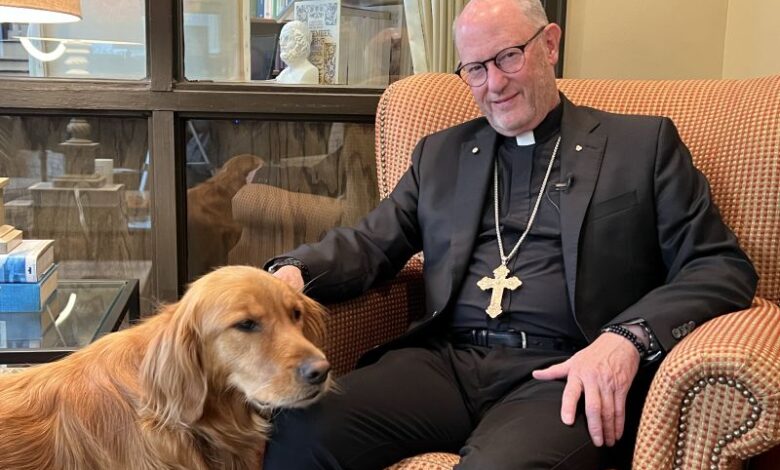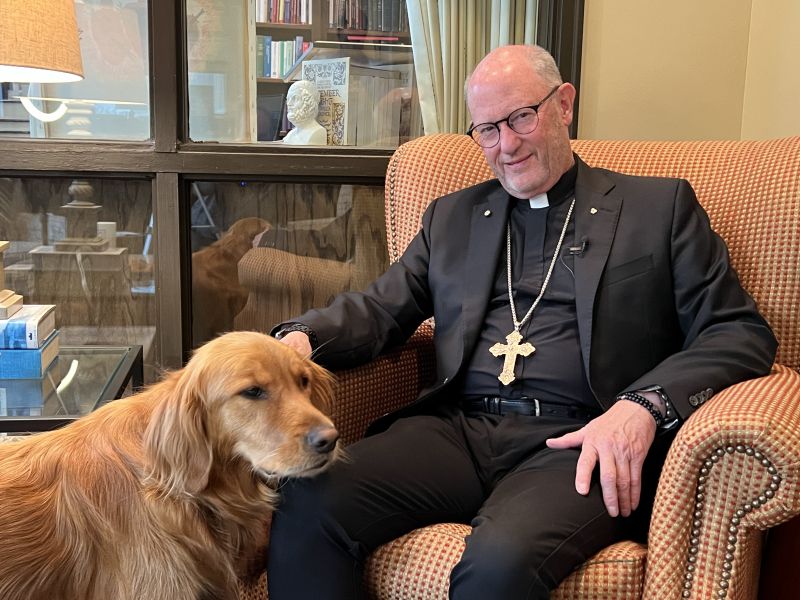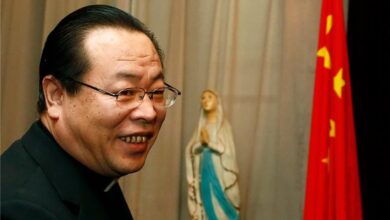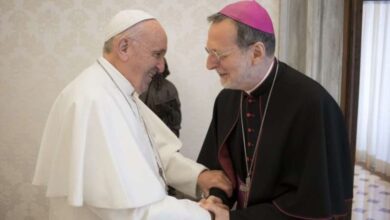Nebraska bishop shares mental illness story, offers message of hope

 Bishop James Conley of the Diocese of Lincoln credits the support of friends, family, medical professionals, and his golden retriever, Stella, with his recovery from mental illness. / Courtesy: Dennis Kellog
Bishop James Conley of the Diocese of Lincoln credits the support of friends, family, medical professionals, and his golden retriever, Stella, with his recovery from mental illness. / Courtesy: Dennis Kellog CNA Staff, May 17, 2024 / 17:14 pm (CNA).
After seven years of heading the Diocese of Lincoln, Nebraska, Bishop James Conley found himself “buckling” under all of his duties and experiencing severe anxiety, insomnia, and depression.
Several years later, after addressing his mental health needs, the bishop shared his reflections on mental health and Christ in a May 16 pastoral letter in which he emphasized the importance of support from his friends, family, medical professionals — and his golden retriever, Stella.
“I was overwhelmed by my responsibilities as bishop and relying too much on my own strength,” Conley wrote in a May 17 introduction to his pastoral letter in the Southern Nebraska Register. “As I received good professional care, I learned that weakness is part of the human condition, but the more we rely exclusively on ourselves, the more those weaknesses are exacerbated.”
Mental health is a growing concern in the United States. The percentage of U.S. adults diagnosed with depression has risen almost 10% since 2015, reaching 29% according to a 2023 Gallup poll, and data from the Centers for Disease Control and Prevention shows that almost half of U.S. teens report experiencing persistent sadness and hopelessness.
The Catholic Church is taking steps to prioritize support and resources for those struggling with mental illness and challenges. From Phoenix to Washington, D.C., dioceses are offering Masses and retreats for people struggling with mental illness, while the Association of Catholic Mental Health Ministers (CMHM) is establishing mental health resources in parishes worldwide.
A bishop’s healing
In his pastoral letter, Conley shared about how stress, overwork, and self-reliance led to the deterioration of his mental, physical, and spiritual health. The road to wellness would be a long one, but when Conley shared why he was taking leave of absence, he received overwhelming support from the people of his diocese.
“About seven years after becoming bishop of Lincoln I started buckling under my episcopal duties,” Conley wrote in the May 16 letter. “The people of this diocese have a beautiful faith, and I wanted to be the strong, invincible leader I thought they deserved. Day in and day out, I tried to fix the problems brought to me instead of surrendering them to the Lord.”
Overwhelmed by the work, Conley noted that overtime, he “slackened in taking care of my own physical and mental well-being.”
“The first thing to go was my sleep because my brain would run nonstop,” Conley wrote. “All night I would lie in bed rehashing the day’s events, wrongly believing everything depended on me, that I was responsible for all the outcomes in the diocese. Although the wear and tear of this lifestyle was taking its toll, I kept trying to muscle through.”
An experienced runner, Conley eventually had to stop running his biannual half-marathons “due to a lack of energy.” He was hardly sleeping and ate “irregularly or not at all.”
“My physical deterioration led to emotional and psychological decline and, before I knew it, I was barely holding onto the last thread of my spiritual health,” he recalled.
Eventually diagnosed with post-traumatic stress disorder, major depression, anxiety, and tinnitus, which can be amplified by stress, Conley “was forced to confront my denial.” But unsure if he could take time off for mental health issues, Conley said he “minimized my problems.”
“Thankfully, my sister, friends, and medical professionals helped me recognize that it wasn’t selfish to take care of myself,” Conley noted.
At the end of 2019, Pope Francis granted Conley permission to take a leave of absence to recover from his mental health issues. Though it was “extremely hard to step away,” Conley said he received an “outpouring of support and prayer” from his diocese.
“I would need all that grace since the hardest part of my journey was still ahead,” he said.
While Conley was recovering, COVID-19 hit, causing the bishop’s “three anchors” of Mass, the rosary, and the Liturgy of the Hours to have “little solace” for him as he often had to offer Mass alone. Thrown into spiritual darkness, Conley “grappled” with the question “Where was God?”
Through meditating on his reliance on Christ, Conley began to recover from “unhealthy self-reliance” while developing his trust in God.
“I started to experience the freedom of surrender as I gradually allowed Jesus to shoulder burdens I had been carrying on my own,” he wrote.
“The last gift of this difficult healing season was my dog, Stella,” he continued. “My good friend Bishop James Wall of Gallup was in the process of getting a puppy and he convinced me to do likewise. We took a seven-and-a-half-hour road trip to El Paso to pick up four 8-week-old golden retrievers, two for us and two for other friends.”
“Looking back it’s funny to think that a 10-pound puppy was crucial in beginning to bring joy back into my life,” he continued. “Stella goes nearly everywhere with me now and is loved by all. Since I live alone, she provides needed companionship and ensures I get outside every day for walks.”
Conley ultimately returned from his leave of absence in November 2020, recovering with the help of several qualified Catholic doctors including a psychologist and psychiatrist. He shared his story with CNA in a 2020 interview.
Catholicism and mental health
Preserving faith through depression can be a challenge, but according to a 2012 study, being religiously involved can help people recover faster from depression. Resources for Catholics struggling with mental health vary; some parishes offer retreats or group ministries, while others provide referrals to therapy or other resources.
Conley noted that in times of spiritual despair, we “must protect” the “treasure” of hope that comes from God.
“When hope wanes, let us remember the countless ways God has blessed us, the particular instances in our lives where he has ‘come through,’ and the dark times when he felt absent but, in hindsight, we could discern his presence,” he wrote.
“A Catholic view of mental health is necessary because it defines well-being according to reason and revelation,” Conley wrote.
“One might rightly ask, if we don’t speak of a Catholic physics or a Catholic biology, why do we need a Catholic understanding of mental health?” he continued. “The answer is because any notion of mental health is laden with beliefs about the human person, about true human anthropology … But notions of human flourishing depend on one’s beliefs about the human person’s origins, purpose, and destiny.”
Allison Ricciardi, a psychotherapist and counselor who launched the website CatholicTherapists.com in 2001, helps connect Catholics with therapists who are dedicated to the Catholic faith and its teachings.
“The teachings of the Church are really solidly grounded in an understanding of the human person,” she told CNA in a phone call. “Between Scripture and teachings of the Church, [they] really do help us to understand human nature and how grace perfects that nature.”
Many saints have struggled with mental illness, Conley observed, and their lives are a reminder “that God is active in every life at all times in history.”
“How comforting to know many saints struggled like us — St. Ignatius of Loyola contemplated suicide, St. Jane Frances de Chantal suffered from depression for over 40 years, St. John of God had a mental breakdown that resulted in hospitalization, and St. Elizabeth Ann Seton struggled with anxiety and depression,” he wrote. “They all grew closer to God through their struggles and so can we.”
“Both body and soul must be attended to, for we reflect and glorify God through both,” he continued. “In this understanding of the human person, we can see how issues in body or soul potentially harm mental health.”




